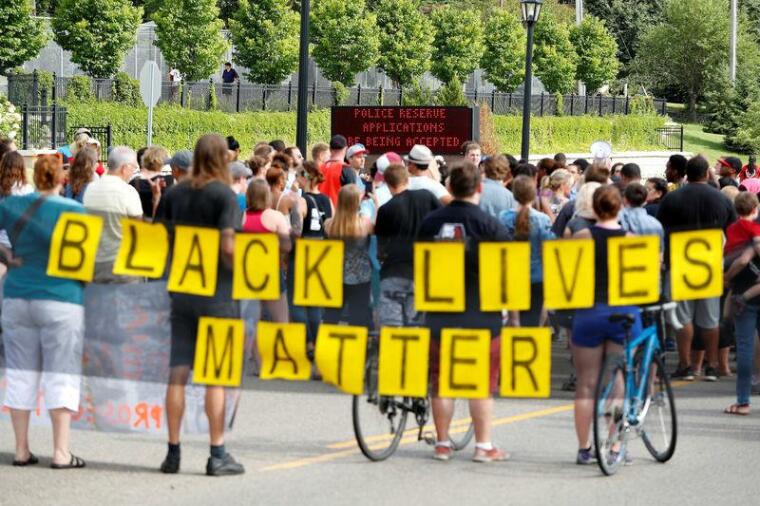Pastor Jamal Bryant: 'Black Lives Matter' is the first movement not led by Church in the US
Pastor Jamal Bryant challenged the American clergy's obvious absence in the Black Lives Matter movement to take to the streets and join the fight for civil rights.

The megachurch pastor and founder of Baltimore's Empowerment Temple AME Church, also known for his active participation in the Black Lives Matter movement, raised his observations on the glaring absence of the Church during a discussion with other preachers and co-hosts of FOX's faith-based newly-launched show, "The Preachers."
"The thing that I really relish in this dialogue is historians long after us will footnote that this [Black Lives Matter] is the very first movement of civil rights in America not led by the Church," said the pastor before throwing out his challenge to fellow church leaders.
"I want to speak to clergy, black and white, if you want to heal America and change a generation, take your robe off and go hit the street corner and do something that is gonna change where it is that we are going," challenged Bryant.
Although not part of the show, another megachurch pastor previously talked about how pastors "led the way" in shaping America's history.
Speaking on another program, "Pathway to Victory," Robert Jeffress of Dallas' First Baptist Church said last month that pastors played a crucial role during the American Revolution, the abolition of slavery and the civil rights movement.
Jeffress' chosen location for his church, the metropolis of Dallas, also played a role in the series of gun shooting violence that wracked the country when a black gunman shot down five white policemen during a Black Lives Matter protest held July 7.
The 25-year-old gunman, Micah Xavier Johnson, reportedly "wanted to kill white people, especially white officers" after the separate shootings by white cops of two African-Americans, Alton Sterling of Baton Rouge and Philando Castile of Minnesota.
 Christians don't have to affirm transgenderism, but they can’t express that view at work: tribunal
Christians don't have to affirm transgenderism, but they can’t express that view at work: tribunal Archaeology discovery: Medieval Christian prayer beads found on Holy Island
Archaeology discovery: Medieval Christian prayer beads found on Holy Island Presbyterian Church in America votes to leave National Association of Evangelicals
Presbyterian Church in America votes to leave National Association of Evangelicals Over 50 killed in 'vile and satanic' attack at Nigerian church on Pentecost Sunday
Over 50 killed in 'vile and satanic' attack at Nigerian church on Pentecost Sunday Ukrainian Orthodox Church severs ties with Moscow over Patriarch Kirill's support for Putin's war
Ukrainian Orthodox Church severs ties with Moscow over Patriarch Kirill's support for Putin's war Islamic State kills 20 Nigerian Christians as revenge for US airstrike
Islamic State kills 20 Nigerian Christians as revenge for US airstrike Man who served 33 years in prison for murder leads inmates to Christ
Man who served 33 years in prison for murder leads inmates to Christ


 Nigerian student beaten to death, body burned over ‘blasphemous’ WhatsApp message
Nigerian student beaten to death, body burned over ‘blasphemous’ WhatsApp message 'A new low': World reacts after Hong Kong arrests 90-year-old Cardinal Joseph Zen
'A new low': World reacts after Hong Kong arrests 90-year-old Cardinal Joseph Zen Iran sentences Christian man to 10 years in prison for hosting house church worship gathering
Iran sentences Christian man to 10 years in prison for hosting house church worship gathering French Guyana: Pastor shot dead, church set on fire after meeting delegation of Evangelicals
French Guyana: Pastor shot dead, church set on fire after meeting delegation of Evangelicals ‘Talking Jesus’ report finds only 6% of UK adults identify as practicing Christians
‘Talking Jesus’ report finds only 6% of UK adults identify as practicing Christians Mission Eurasia ministry center blown up in Ukraine, hundreds of Bibles destroyed: 'God will provide'
Mission Eurasia ministry center blown up in Ukraine, hundreds of Bibles destroyed: 'God will provide' Church holds service for first time after ISIS desecrated it 8 years ago
Church holds service for first time after ISIS desecrated it 8 years ago Burger King apologizes for 'offensive campaign' using Jesus' words at the Last Supper
Burger King apologizes for 'offensive campaign' using Jesus' words at the Last Supper Uganda: Muslims abduct teacher, burn him inside mosque for praying in Christ’s name
Uganda: Muslims abduct teacher, burn him inside mosque for praying in Christ’s name